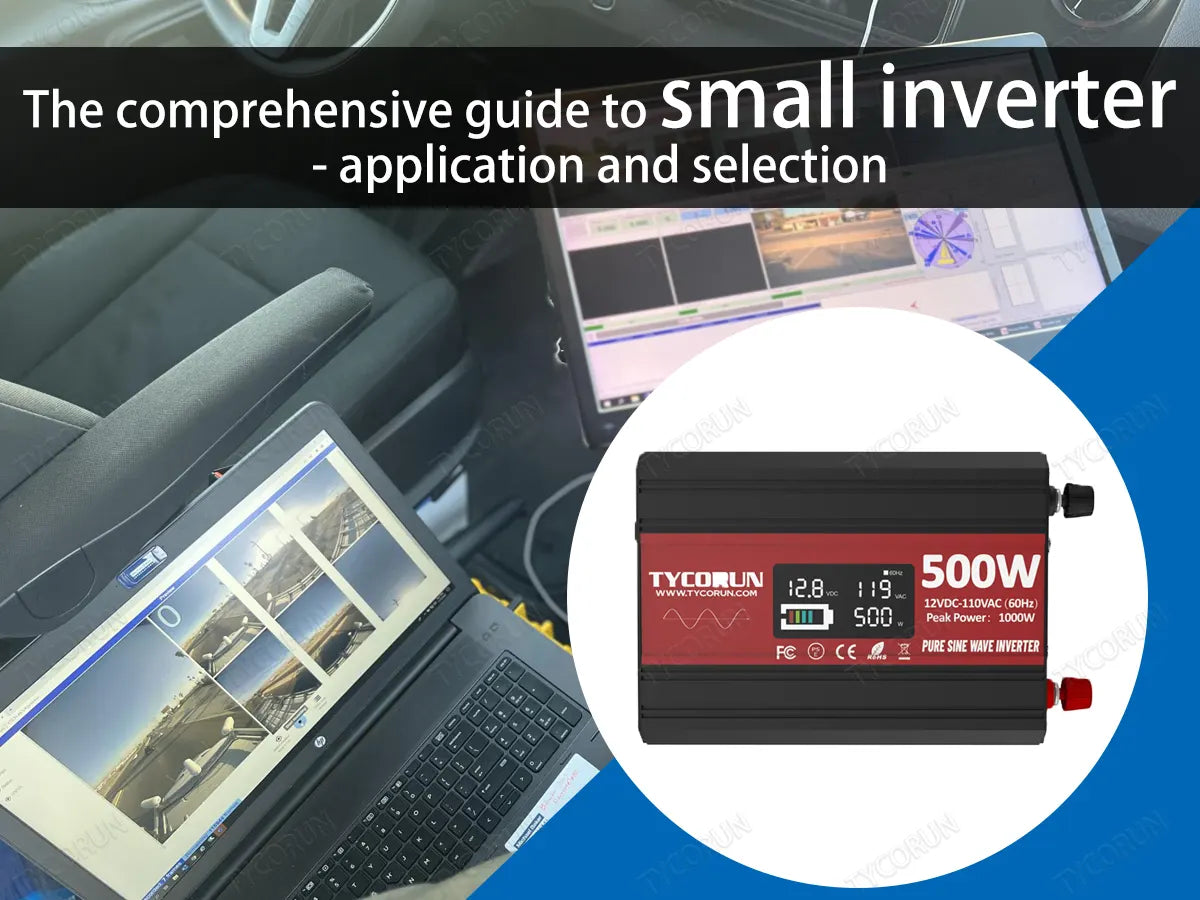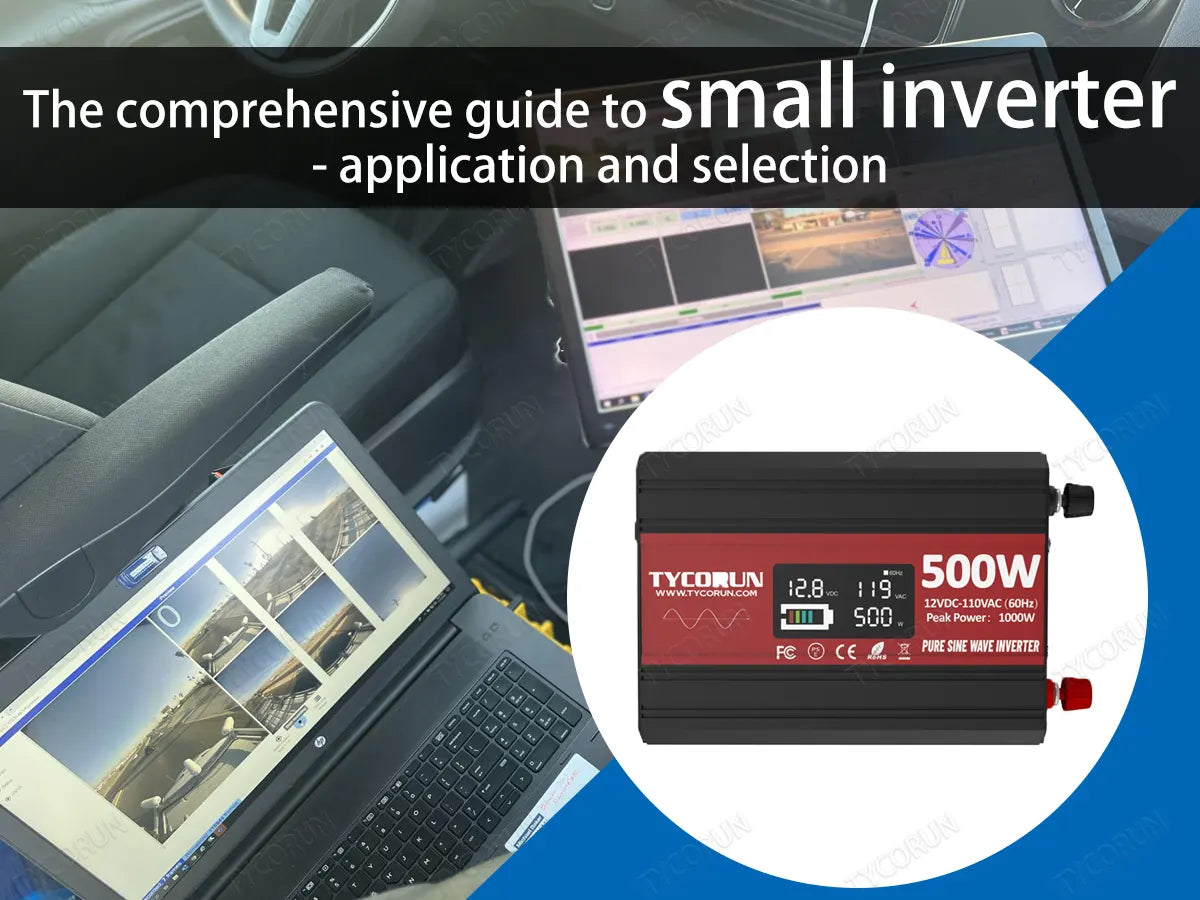
In our increasingly mobile and technology-driven world, the demand for portable power solutions has surged. Small inverter, with their ability to convert DC power to AC, have become essential companions for individuals seeking on-the-go energy sources.
This comprehensive guide delves into the intricacies of small inverter, exploring their capacities, applications, efficiency, lifespan, cost, and highlighting a standout contender in its class—the Tycorun 500 w power inverter.
Main content:
- What is a small inverter?
- The smallest type of inverter: Micro-inverters
- What will a 500w small inverter power?
- Applications of small inverter - from cars to laptops and beyond
- Difference between small inverter and high-power inverter
- Efficiency of small inverter: Are smaller inverters more efficient?
- How long do small inverter last?
- How much does a small inverter cost?
- How to choose small inverter for sale
- Which is the cheap and best small inverter
1. What is a small inverter?
A small inverter serves as a crucial link between portable power sources, like batteries, and the devices we use daily. In terms of wattage, small inverter typically range from 100W to around 1000W.
This spectrum covers a variety of applications, from charging electronic gadgets to powering small appliances. Understanding what constitutes a "small" inverter is subjective and can vary based on individual needs.
However, the general consensus places these devices in the lower to mid-range of the wattage scale, catering to the power requirements of common electronic devices.
2. The smallest type of inverter: Micro-inverters
Within the realm of small inverter, micro-inverters represent the smallest type. Particularly prevalent in solar energy systems, each solar panel equipped with its micro-inverter enables decentralized energy conversion.
This design optimizes energy harvesting, enhances system performance, and ensures that the overall efficiency of the solar setup is maximized.
3. What will a 500w small inverter power?
The wattage of a small inverter determines its capacity to power different devices. A 500W small inverter, for example, can handle a variety of electronic gadgets and small appliances.
This includes charging laptops, powering LED lights, running small fans, and even operating low-wattage kitchen appliances. Understanding the power requirements of your devices is crucial when selecting the right-sized inverter. A 500W inverter strikes a balance, offering sufficient power for common applications while remaining portable and energy-efficient.
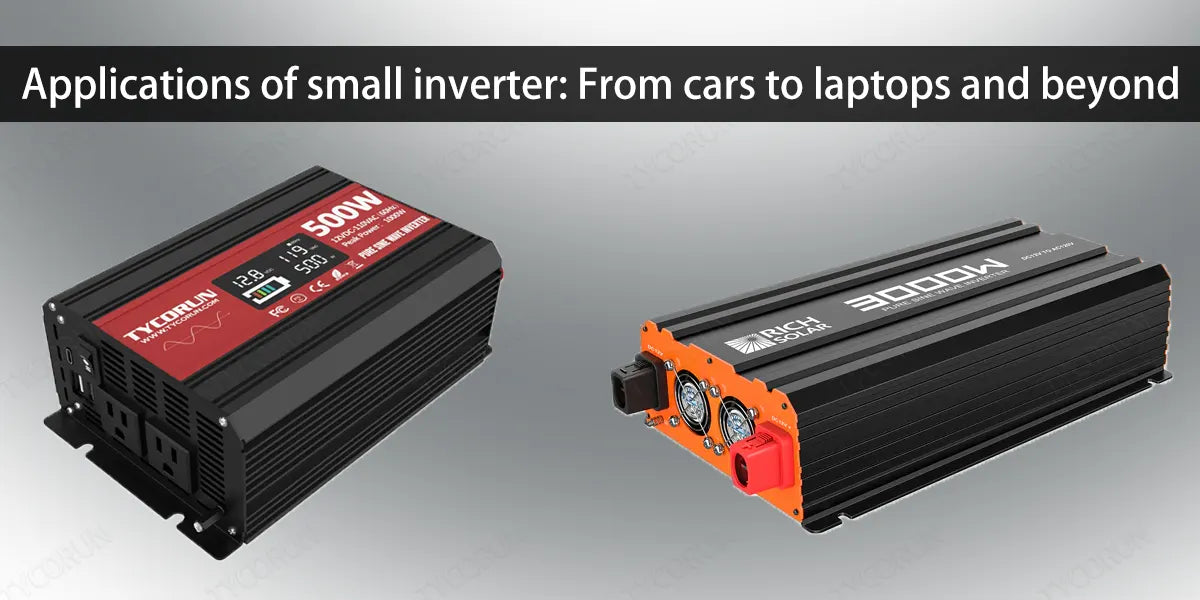
4. Applications of small inverter - from cars to laptops and beyond
small inverter find applications in diverse settings, making them incredibly versatile. One of their primary applications is in cars, where they provide a convenient way to power electronic devices on the road.
For those enjoying the freedom of RV travel, small inverter play a pivotal role in providing a reliable power source for various appliances. Their compact design and compatibility with 12V systems make them an ideal choice for mobile power solutions. Not only can be used as RV inverter, but also in camping, more applications can see applications of inverter.
5. Difference between small inverter and high-power inverter
While both small and high-power inverters share the fundamental function of converting DC to AC power, the key distinction lies in their wattage capacities. High-power inverters, often exceeding 1000W, are designed to meet more substantial energy demands. These may include running power tools, operating kitchen appliances, or serving as a backup power source for an entire household.
Small inverter, on the other hand, are tailored for the needs of individual users who require portable and compact power solutions. The trade-off is often between portability and the ability to power larger appliances.
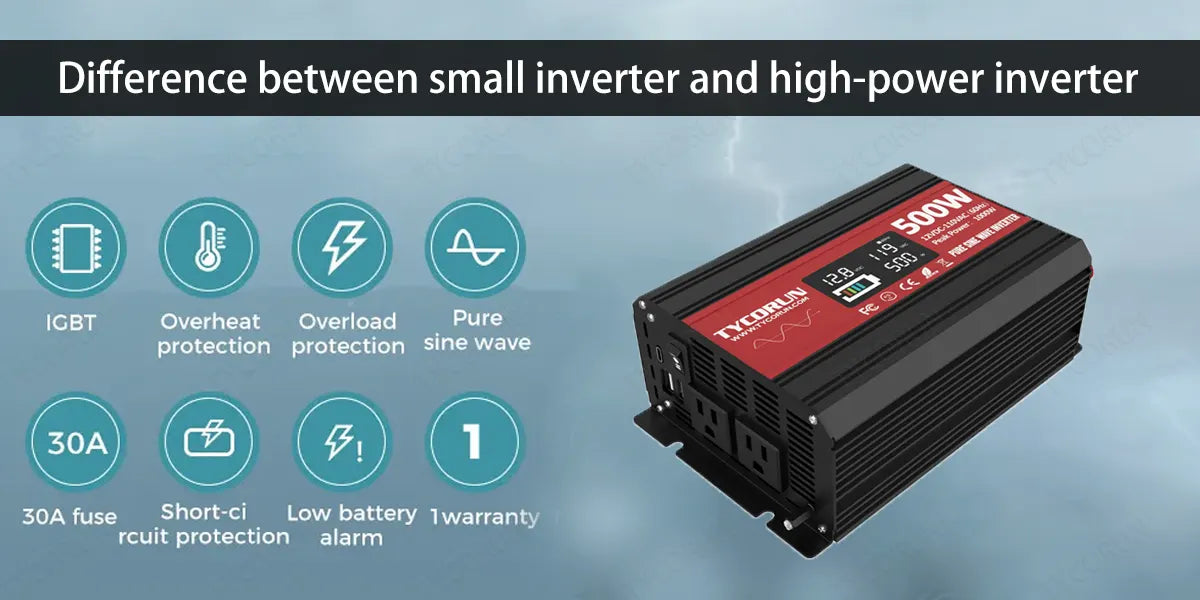
6. Efficiency of small inverter: Are smaller inverters more efficient?
The efficiency of an inverter is a crucial factor in determining its overall performance. Efficiency in this context refers to how well the inverter converts DC power from the source (such as a battery) into AC power for devices.
Generally speaking, the greater the power of the inverter, the greater its efficiency, but the input voltage, load power and temperature and so on, will affect the working efficiency of the inverter, so the actual efficiency needs to be calculated according to the actual situation. In the choice between small invert and high power inverter, we do not say that we blindly pursue high power, depending on the specific load power demand, otherwise it will lead to the waste of electricity.
However, advancements in technology have allowed larger inverters to achieve impressive efficiency ratings as well, blurring the lines between small and high-power categories. The 500w small inverter of Tycorun inverter has a conversion efficiency of more than 90%.
7. How long do small inverter last?
The lifespan of a small inverter is influenced by various factors, and understanding these can contribute to maximizing its longevity. Factors such as build quality, usage patterns, and environmental conditions play significant roles in determining how long a small inverter will remain operational.
Generally, a well-maintained small inverter can last for several years. Regular maintenance, adherence to operational guidelines, and protection from extreme conditions contribute to prolonged functionality. It's important to note that like any electronic device, wear and tear over time can affect performance, so periodic checks are recommended.
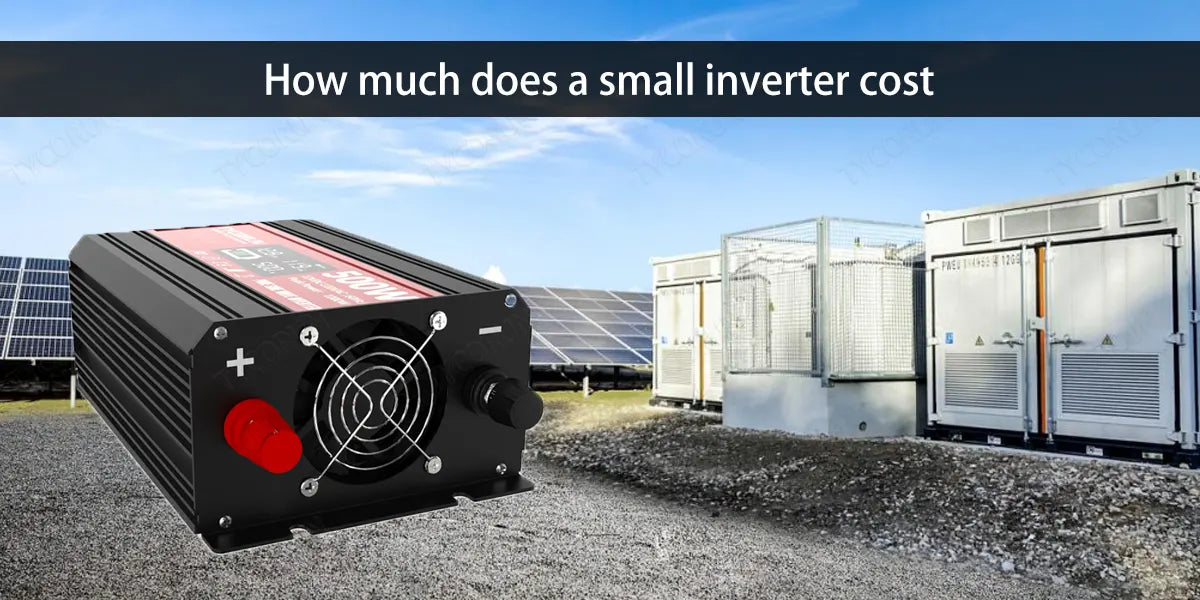
8. How much does a small inverter cost?
The cost of small inverter varies widely based on several factors. Brand reputation, features, wattage capacity, and additional functionalities all contribute to the overall price. Entry-level models, offering basic features and lower wattage, can be quite affordable.
However, more advanced or higher-wattage options like 2000 watt inverter and 3000 watt solar inverter may come with a higher price tag. When considering the cost of a small inverter, it's essential to weigh it against your specific needs. If the inverter meets your requirements and offers additional features that align with your intended applications, the investment may be justified.
9. How to choose small inverter for sale
Navigating the options when choosing small inverter for sale requires a thoughtful consideration of various factors. Here's a guide to help you make an informed decision:
- Wattage: Assess your power needs and choose an inverter with an appropriate wattage. For example, if you plan to use it in a car (commonly equipped with a 12V system), a small 12V inverter with sufficient wattage would be suitable.
- Build quality: Look for inverters from reputable brands known for their build quality. You can review the best solar inverter brands for reference. A sturdy design contributes to durability and ensures that the inverter can withstand the rigors of portable use.
- Additional features: Consider any additional features that may enhance the usability of the inverter. This could include multiple AC outlets, USB ports for charging gadgets, or safety features such as overload protection.
- Compatibility: Ensure that the inverter is compatible with the devices you intend to power. Check the types of outlets it offers and confirm that they match the plugs of your electronic gadgets.
- User reviews: Reading user reviews can provide valuable insights into the real-world performance of a specific inverter. Pay attention to feedback regarding reliability, durability, and ease of use.
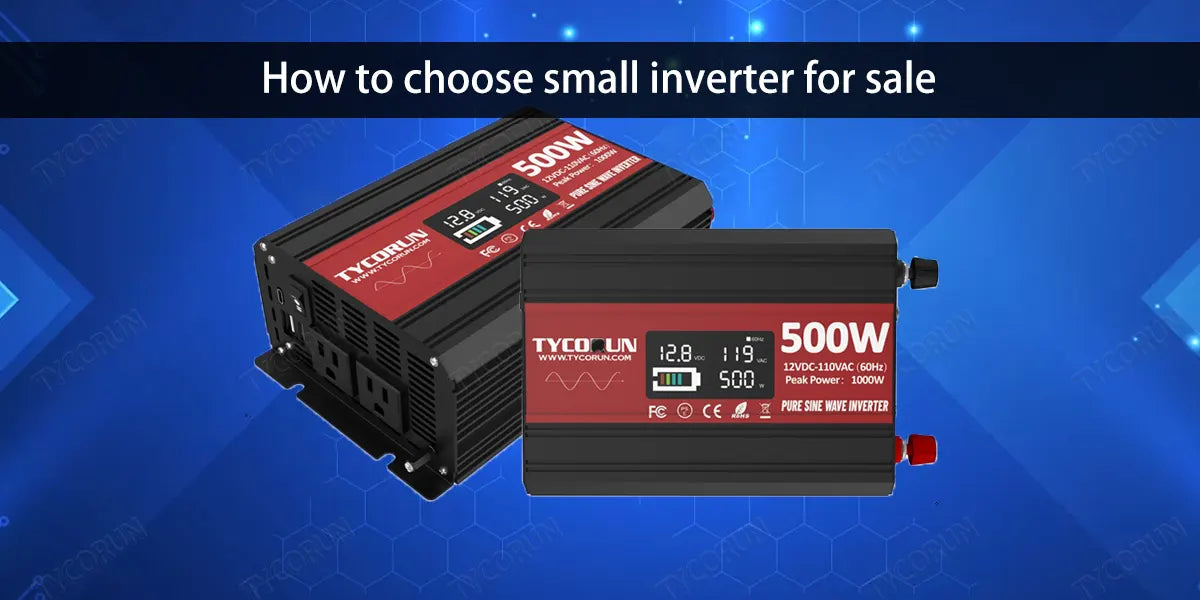
10. Which is the cheap and best small inverter
In the landscape of small inverter, the Tycorun 500W inverter emerges as a standout choice that balances affordability with performance.
Here are some key features that make the Tycorun 500W inverter an excellent option:
- Compact design: The Tycorun 500W inverter is designed with portability in mind. Its compact and lightweight build makes it easy to carry and store, catering to the needs of users on the move.
- Optimized for 12V systems: This inverter is specifically optimized for 12V systems, making it a suitable choice for use in cars, RVs, and other setups with a 12V power source.
- Essential safety features: Tycorun prioritizes safety with features such as overload protection. These safety measures ensure the protection of both the inverter and connected devices from potential damage.
- Balanced performance: With 500W of power, this inverter strikes a balance between providing sufficient power for common applications and ensuring energy efficiency.
|
|
500w
|
1000w |
2000w
|
3000w
|
|
Product image
|
||||
|
Price & Discount
|
$49.9(-29%)
|
$98.99(-29%)
|
$199.90(-20%)
|
$229.00(-23%)
|
|
Rated Input Voltage
|
12VDC
|
12VDC
|
12VDC
|
12VDC |
|
Continuous Power
|
500w
|
1000w
|
2000w
|
3000w |
|
Peak Power
|
1000w |
2000w |
4000w |
6000w |
|
More information |
Click to get the details |
Click to get the details |
Click to get the details |
Click to get the details |
In conclusion, small inverter play a vital role in providing portable power solutions for a variety of applications.
Related posts: microinverter vs optimizer, top 5 solar microinverter companies in the world, solar microinverter


